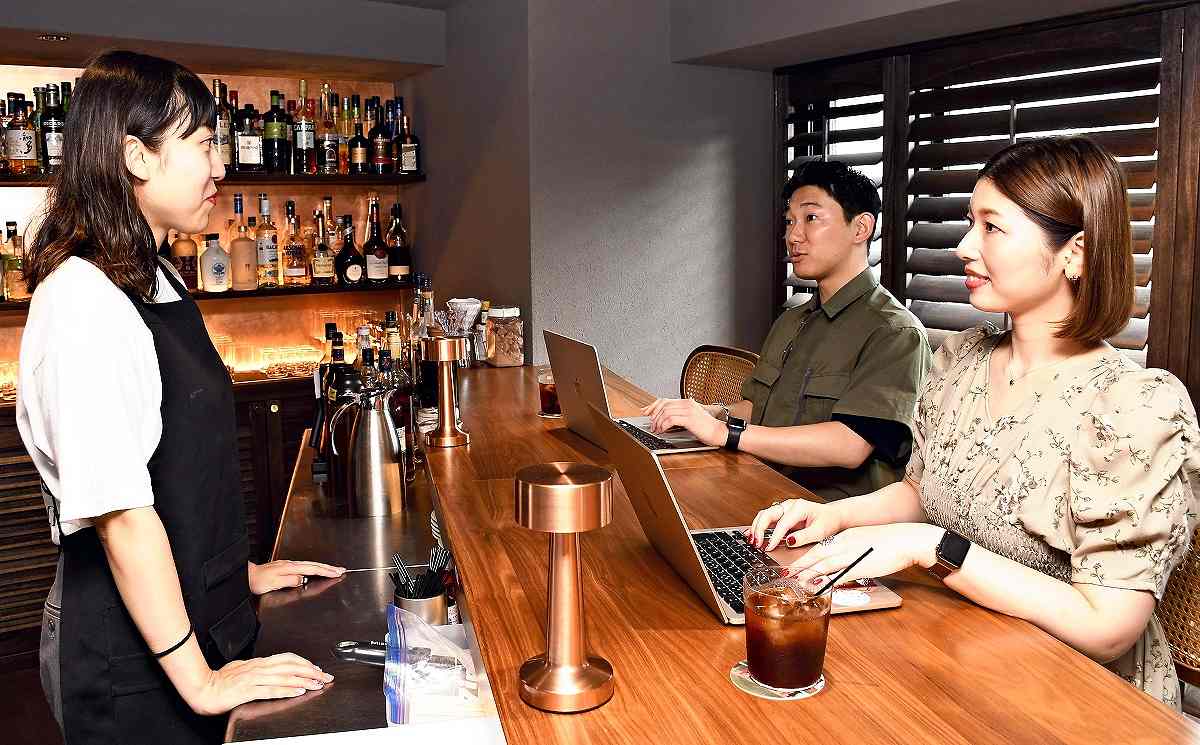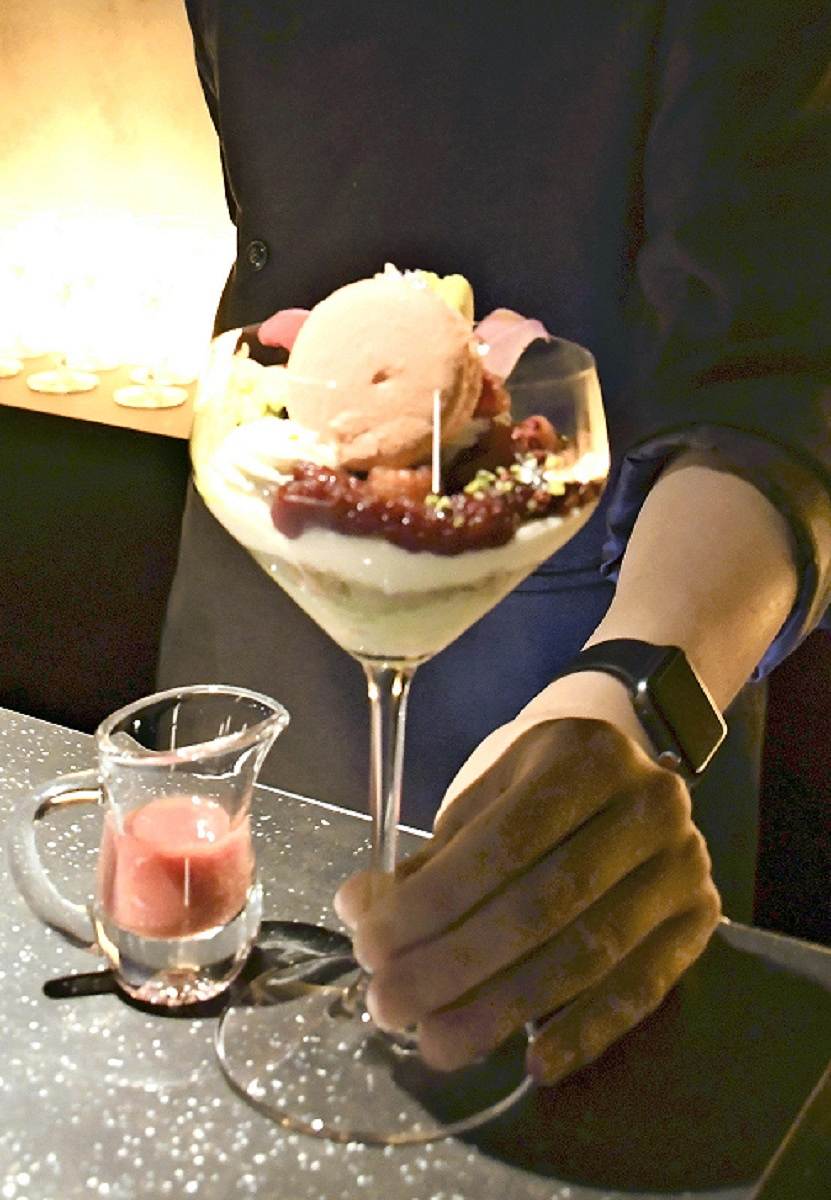Tokyo’s ‘Secret’ Restaurants Popular with Customers for Their Mystique; Members-Only Eateries Offer a Different Atmosphere

Customers chat at Unin in Shibuya Ward, Tokyo. Many customers bring their laptops to do work.
13:15 JST, October 13, 2024
Some eating and drinking establishments are becoming popular even though they do not widely disclose their addresses or have any business signs, making them hard to find. Often these establishments require you to be a member and make an effort to search for them in alleys once you obtain their address.
What makes these places so appealing despite the time and effort?
In an area lined with multitenant buildings in Tokyo’s Shibuya Ward, I reached a building by following a map in my hand. There was no business sign outside. Slightly nervous, I pulled open the door to find a circular bar counter. Gently lit by lamps, the interior was a different world from the outside hustle and bustle.
This cafe bar is called Unin. You can only get its address by becoming a member and paying a monthly fee that starts at ¥4,980. It opened two years ago and now has about 500 members whose ages range from their late 20s to 70s.
Kengo Yanai, 25, a company employee in Tokyo, says he visits the cafe bar about once a week. “I like the feeling of surprise when I open the door. I’ve brought friends along before,” he said.
A 37-year-old woman working as a freelance writer in Tokyo says that customers get to know each other over the course of their visits. “I will always meet someone I know when I come here. There aren’t that many places where you can make real friends as an adult,” she said with a smile.
Tomoya Fujiwara, president of the company that operates Unin, says that since its address is not disclosed, people who do not fit in the cafe’s relaxed atmosphere will not come.
A so-called parfait bar by the name of Remake easy also does not disclose its address. The eatery has six establishments nationwide, including in Tokyo, Osaka and Nagoya. The parfait bar also has a membership system that starts at ¥3,300 per month, with additional charges for food and drinks.

A parfait prepared at Remake easy in Toshima Ward, Tokyo. A monthly special menu and other services are offered to keep member customers coming back.
I visited the Ikebukuro eatery in Toshima Ward, Tokyo, on a late August evening. The counter in the dimly lit interior seated 10 or so guests and was occupied mainly by women in their 20s and 30s.
An employee skillfully prepared a parfait while explaining what makes it special, such as the seasonal fruits it uses. As he spoke, the atmosphere began to relax and customers started to chat about things such as their favorite parfaits and cocktails.
A parfait and cocktail cost around ¥5,000 in total, which is a considerable amount. Nevertheless, the parfait bar is so popular that new members, who are invited on an irregular basis, need to be selected by lottery.
Remake easy CEO and patissier Oki Hayashi, 29, said: “It’s a closed-off space, so it’s easy for even men to come alone. The atmosphere is like a snack bar, where you can have a once-in-a-lifetime encounter, so it’s well-received by guests.”
Benefits of secrecy
According to Naoki Tanaka, director of Hot Pepper Gourmet’s food service research center in Tokyo, the number of membership-only restaurants increased after the COVID-19 pandemic. Although restaurants without signs are hard to attract passersby, “if [the restaurants] have a membership system, they have regulars and can predict the number of customers. They can easily make a business plan and minimize food loss,” he said.
JunMugi, a ramen shop in Shinagawa Ward, Tokyo, that opened last year also does not disclose its address, but for a different reason.
The owner, Jun Yajima, runs the shop by herself and uses a system where customers are informed of the address after they make reservations. “It’s better for a restaurant managed by one woman to not give out the address,” she said.
The restaurant is in a residential area and does not have a sign outside. Customers have said things like, “It’s like a comfortable hideout,” and “I don’t want to let other people know about it.”
Yajima said, “Some customers tell me that making the effort to find the restaurant adds spice to the food served here.”
What makes people want to visit restaurants that take an extra step to get to?
Naoko Kuga, a senior researcher at the NLI Research Institute and an expert on consumer behavior, analyzed their popularity. She said that while people’s experiences flood social media sites, “some want to experience something ‘premium,’ such as eating food that is only served in a certain place.”
Getting to restaurants that have no signs requires customers to discover the necessary information and find out where they are.“The special sense of togetherness created by the exclusive space of these restaurants is also a reason behind their popularity,” Kuga added.
Top Articles in Features
-

Tokyo’s New Record-Breaking Fountain Named ‘Tokyo Aqua Symphony’
-

Sapporo Snow Festival Opens with 210 Snow and Ice Sculptures at 3 Venues in Hokkaido, Features Huge Dogu
-

Tourists Flock to Ice Dome Lodge at Resort in Hokkaido, Japan; Facility Invites Visitors to Sleep on Beds Made of Ice
-

High-Hydration Bread on the Rise, Seeing Increase in Specialty Shops, Recipe Searches
-

Heirs to Kyoto Talent: Craftsman Works to Keep Tradition of ‘Kinran’ Brocade Alive Through Initiatives, New Creations
JN ACCESS RANKING
-

Japan PM Takaichi’s Cabinet Resigns en Masse
-

Japan Institute to Use Domestic Commercial Optical Lattice Clock to Set Japan Standard Time
-

Israeli Ambassador to Japan Speaks about Japan’s Role in the Reconstruction of Gaza
-

Man Infected with Measles Reportedly Dined at Restaurant in Tokyo Station
-

Videos Plagiarized, Reposted with False Subtitles Claiming ‘Ryukyu Belongs to China’; Anti-China False Information Also Posted in Japan























